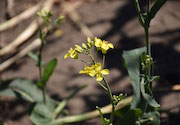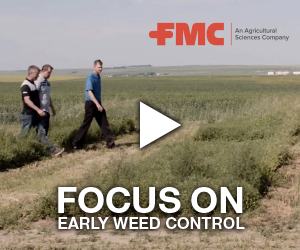| |
| |
 |
 |
| |
 |
|
@{mv_date_MMM d, yyyy}@ |
|
| |
 Predicting future economic trends has become more difficult due to the continuing COVID-19 pandemic and its resultant uncertainty and supply chain issues, major weather events, and stymied movements of people and commodities.
» Read more...
Predicting future economic trends has become more difficult due to the continuing COVID-19 pandemic and its resultant uncertainty and supply chain issues, major weather events, and stymied movements of people and commodities.
» Read more...
The newly formed joint venture will look to construct a $360 million canola crush facility, which will supply approximately 50 per cent of the feedstock required for a 15,000-barrel-per-day renewable diesel plant.
» Read more...
There’s an incredible amount of collaboration taking place within the ag industry and, when paired with strategy, knowledge transfer, and technological advancements, the future's looking bright.
» Read more...
|
| |
 |
 |
| |
|
| |

It’s that time of year again to start thinking about treating your seed, which means now’s the time to plan for your best season yet! Looking for information about on-farm treating and equipment options?
Wondering how many bushels you can treat with a jug versus a tote? What product is the best agronomic fit for your crop? Or even evaluating if you should treat your seed at all? The Bayer SeedGrowth ® team has those answers and solutions designed to work for you. They’ve rounded up 7 great reasons why you should treat your seed, and some application tips that help make the process simple and headache free. By using a seed treatment you’re giving your seed the protection it needs for stronger, more even emergence, and enhanced yield potential. Read up on all the benefits of finding the right seed treatment for you, how the equipment available today makes it easier than ever to get the job done, and how treating your seed pays off in the bin.
» Ready to protect your seed? |
| |
|
| |
 May you never have to live through another drought – but if you do, researchers like the University of Calgary’s Marcus Samuel are moving forward with drought-tolerant crops. While they wouldn’t be able to tolerate the 2021 drought that occurred in many areas of the Prairies, drought-tolerant canola and wheat varieties under development might help survive less severe droughts.
» Learn more...
May you never have to live through another drought – but if you do, researchers like the University of Calgary’s Marcus Samuel are moving forward with drought-tolerant crops. While they wouldn’t be able to tolerate the 2021 drought that occurred in many areas of the Prairies, drought-tolerant canola and wheat varieties under development might help survive less severe droughts.
» Learn more... |
| |
 Crop growers and scientists know that more diverse crop rotations are associated with better crop performance and better yields. As a soil microbiologist, Jennifer Town knows that adding diversity in your crop rotation is one way that you can change the composition of fungi and bacteria in your soil. But how does this more diverse microbial community contribute to those higher crop yields?
» Learn more...
Crop growers and scientists know that more diverse crop rotations are associated with better crop performance and better yields. As a soil microbiologist, Jennifer Town knows that adding diversity in your crop rotation is one way that you can change the composition of fungi and bacteria in your soil. But how does this more diverse microbial community contribute to those higher crop yields?
» Learn more... |
| |
|
| |

CONTROLLING TOUGH WEEDS LIKE KOCHIA IN LENTILS TAKES AN INTEGRATED WEED MANAGEMENT APPROACH.
In July 2019, FMC's technical experts visited their research plots in Swift Current to check out a lentil trial that compared two different spring weed management practices: glyphosate with a burnoff add-in versus glyphosate with a burnoff add-in AND a pre-emergent extended weed control product.
WATCH THE VIDEO AND SEE THE RESULTS FOR YOURSELF!
Sponsored by:

|
| |
|
| |
 Desiccation is an important management tool for lentil growers, but some desiccants are under scrutiny by consumers and lentil buyers. As a result, researchers at the University of Saskatchewan are looking for alternatives. Neither glyphosate nor glufosinate are recommended for preharvest use in lentil – even though it is registered – because some importing countries have lower MRLs.
» Read more...
Desiccation is an important management tool for lentil growers, but some desiccants are under scrutiny by consumers and lentil buyers. As a result, researchers at the University of Saskatchewan are looking for alternatives. Neither glyphosate nor glufosinate are recommended for preharvest use in lentil – even though it is registered – because some importing countries have lower MRLs.
» Read more...
Kochia keeps tumbling across the Prairies and it is a particularly troublesome weed in lentil, which is a poor competitor against weeds in the first place. Added into the mix is that all Prairie kochia is considered resistant to Group 2 herbicides. Jessica Enns, WARC general manager, has been involved in several studies looking at alternative control of kochia in lentil, including herbicide layering and crop rotations.
» Read more...
|
| |
|
| |
 In today’s agriculture industry, having sound farm business management is more important than ever. Resources to support farmers as their operations become larger and more complex are either too costly, too time consuming, or not relevant to today’s farming practices.
» Learn more...
In today’s agriculture industry, having sound farm business management is more important than ever. Resources to support farmers as their operations become larger and more complex are either too costly, too time consuming, or not relevant to today’s farming practices.
» Learn more... |
| |
|
| |

|
| |
| |













